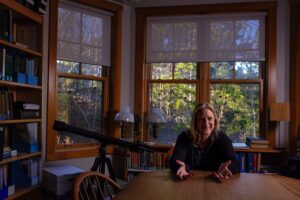TRURO — When Chris Kaufmann, who grew up in Pelham, N.Y., was eight years old, she saw Rupert Holmes’s The Mystery of Edwin Drood on Broadway. The only thing she remembers from the experience is the musical’s unusual interactive element: the audience votes on what happens next.

Kaufmann, the new director of the Truro Public Library, has been a librarian for 13 years, so
seeking the community’s input has long been an undercurrent of her career. “Librarians are not just here to help you find the next book to read,” she says. “We fill a gap. We look into our communities and see what isn’t being offered.”
Kaufmann was selected this month from among more than 20 applicants to succeed Tricia Ford, who retired on Oct. 8 after 12 years in the director’s job. While admiring the library’s established place in the community, Kaufmann says she hopes to gradually expand its reach, including to those who might never visit its physical space.
“I’m not a fan of drastic changes,” Kaufmann says. She takes a more incremental approach to leadership, she says, adding that she hopes she can broaden people’s perceptions of what a library can be and who it can serve.
Being a librarian, she points out, means being an eclectic problem-solver. On any given day, she might help someone apply for a job, identify a scam email, or demystify an iPhone. She has delivered materials to homebound patrons, helped small business owners navigate licensing, and taught cybersecurity basics.
After a decade working as a paralegal in New York and Chicago, Kaufmann became a librarian in 2011, starting at the Brooks Free Library in Harwich. She later worked at the Brewster Ladies’ Library and Yarmouth Town Libraries, where she developed resources for patrons with disabilities.
“I was witnessing uneven levels of service,” she says, citing the Brooks Free Library’s program for people with vision loss as unique on Cape Cod. Kaufmann also observed that neurodivergent patrons and those with intellectual disabilities often sought her out. “I wondered why and what I could do about it,” she says.
That curiosity has shaped her career. In 2020, she earned a master’s in library science from Simmons University in Boston, and she’s currently pursuing a Ph.D. there, focusing on disability studies and accessibility in public libraries. She points out that much research on accessibility is done by people who have never worked in libraries, and that’s something she hopes to change.
For Kaufmann, accessibility means cultivating a library where everyone feels welcome, regardless of how they learn, socialize, or experience the world. “You shouldn’t require proof from someone that they need help,” she says. “We should be advocating for people.”
This aligns with the ethos of the CLAMS Library Network, a resource-sharing cooperative founded in 1988 that encompassed 35 libraries on the Cape and Islands. In 2023 alone, the network gained 21,000 new borrowers and recorded 1.5 million checkouts of a diverse range of materials.
Kaufmann has chaired the CLAMS Bibliographic Implementation Committee since 2018, overseeing the computerized records of all collections. Before that, she chaired the CLAMS Public Services Implementation Committee.
In Truro, Kaufmann plans to expand the library’s physical and digital collections, adding more large-print books, audiobooks, and electronic resources to better serve patrons with vision impairments, dyslexia, and other print disabilities. This is practical as much as personal: Kaufmann herself is dyslexic.
She’s also a fan of mysteries. Right now, she’s listening to How to Solve Your Own Murder by Kristen Perrin. And she’s bringing her Zoom-based mystery book club with her from the Yarmouth Town Libraries.
Technology education is a priority. Offering classes on topics like cybersecurity could be one avenue to help patrons navigate an increasingly complex digital landscape, she says.
“Technology is outpacing the ability of many people to learn it,” she says. “Building confidence is a key component of teaching technology because a lot of people think that it is something that is permanently beyond their ken.”
Kaufmann also sees libraries as guardians of information literacy amid rising misinformation and threats to free speech.
“This is not the first time this has happened in history — we go through these witch hunts over and over,” she says. “We can’t tell people how to think, but we can provide them with all the tools to teach themselves and try to understand where their information is coming from.”



